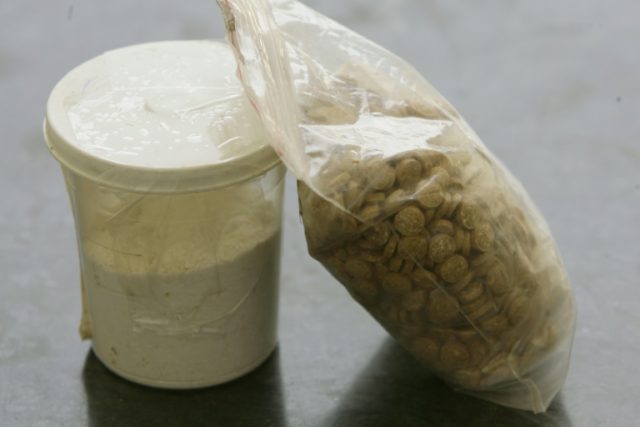Syrian rebels, backed by the U.S.-led coalition against the Islamic State (ISIS/ISIL), at the end of last month captured a $1.4 million cache of narcotics owned by the terrorist group, including more than 300,000 highly-addictive amphetamine-based Captagon pills known as the “jihadists’ drug,” the alliance announced this week.
According to the anti-ISIS mission in the Middle East known as Operation Inherent Resolve (OIR), Maghawir al-Thawra, a Syrian rebel group trained by both the United States and Jordan, seized the cache on May 3 and destroyed it on June 12.
“Our dedicated partner forces are committed to the defeat-Daesh [ISIS] mission,” Maj. Gen. James Jarrard, the special operations unit commander for OIR, declared in a press release Monday, referring to the seizure. “This is another great example of their dedication and professionalism in the fight against Daesh and in the protection of the people of southern Syria.”
“Despite Daesh’s [ISIS] façade of Islamic purity, its criminal terrorists are known drug users and traffickers. The cache included more than 300,000 pills of Captagon, an illegal drug frequently trafficked and used by Daesh members. Captagon is a highly-addictive amphetamine-based drug that is banned in many countries. It is informally referred to as the “jihadists’ drug,'” the U.S.-led coalition noted on Monday.
“The seizure and destruction of drugs, weapons and other contraband further reduces [ISIS’] abilities to fund and conduct combat operations,” the alliance added.
According to the coalition, the Syrian rebels captured the narcotics during May 31 operations within the 34-mile de-confliction zone near al-Tanf, which sits along Syria’s border with Jordan.
“A 55-kilometer (34 mile) de-confliction zone around the garrison is meant to serve as a buffer between US-backed forces and fighters loyal to Syria’s regime,” the Agence France-Presse (AFP) agency explains.
Since ISIS rose to prominence in 2014, various news reports have linked the group’s members to the trafficking and abuse of the synthetic stimulant fenethylline, known by its trade name Captagon.
“Captagon is classified by the UN Office on Drugs and Crime as an ‘amphetamine-type stimulant’ and usually blends amphetamines, caffeine and other substances,” AFP points out.
In 1986, the World Health Organization (WHO) banned the substance due to abuse, but the drug continues to be a problem in the Middle East.
Reuters reported in 2016:
A synthetic psychoactive drug linked to substance abuse in the Middle East and said to be a fund-raising tool and stimulant for Islamist militants is more dangerous than previously thought, scientists said on Wednesday.
The stimulant, called fenethylline and by its trade name Captagon, is a super-boosted amphetamine, they said and has unique chemical complexities allowing it to induce potent psychoactive effects far more rapidly than amphetamines alone.
…
They warned its popularity among drug users could spread from the Middle East across the world.Experts estimate that in Saudi Arabia, some 40 percent of drug users between the age of 12 and 22 are addicted to fenethylline.
Illicit production of the drug, which the experts described as “very easy to make,” and counterfeits of it serves as sources of revenue for ISIS and other jihadi groups in the Middle East, AFP notes.
ISIS jihadists have been taking the drug to fuel their maniacal terror campaign.
“It is often referred to as the ‘jihadist’ drug, as fighters who take it say it helps them stay awake for days and that it numbs their senses, allowing them to kill with abandon,” AFP reports.

COMMENTS
Please let us know if you're having issues with commenting.